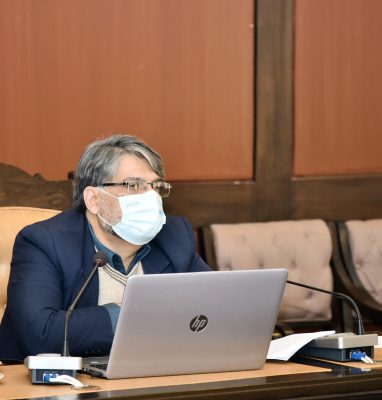
The Pakistan Institute for Parliamentary Services (PIPS), in collaboration with the International Centre for Migration Policy Development (ICMPD), organized a virtual Parliamentary roundtable on the topic of International Labor Migration: Challenges and Prospects on March 19, 2021. The roundtable aimed to stimulate intellectual debate on the issues confronting migrants in particular and the government, as well as to provide a platform for the exchange of ideas in order to generate policy recommendations and a way forward. The roundtable was attended by around 16 Members of Parliament, officials from PIPS and ICMPD.
Mr. Muhammad Anwar, Executive Director PIPS welcomed the participants. He stated that MPs are drivers of change in the Parliament whose voices impact policies and governments. Mr. Anwar expressed that although successive governments have taken largely effective initiatives in facilitating labor migration; the nature of international system is complex and ever evolving which keeps governments and policy makers vigilant and on their toes. Ensuring safe migration and protection of migrants from all forms of abuse and exploitation is not only the state’s responsibility but also an international commitment and basic human right.
Ms. Hina Maqsood, Project Officer, ICMPD, discussed the challenges and prospects of overseas labour migration in the first session, emphasizing the importance of diversifying host countries by exploring new job markets and connecting future migrants with government departments so that they can take advantage of better services and opportunities.
Mr. Muhammad Ismail, Deputy Secretary, Ministry of Overseas Pakistanis and Human Resources Development, discussed recent developments by the government in this regard and informed participants that the Honorable Prime Minister has also tasked MOPHRD to explore employment opportunities in five states, including China and South Korea, as part of a focused initiative. In terms of labour migrants’ social security, he stated that negotiations with a number of countries, including Canada and Malaysia, are underway to provide them with better protection.
Honorable MNA Ms. Romina Khurshid Alam lauded the efforts of the PIPS and ICMPD. She highlighted the difficulties that Pakistani migrants face in the labour market when compared to other countries in the region due to a lack of skills and education. She stressed the importance of maintaining a robust database of migrants and returnees, as well as returning migrants’ reintegration based on their education, skills, and professional experience. She stated that assessing returning migrants’ education and skills is critical in providing them with opportunities that benefit both them and the state.
Senator Shaheen Khalid Butt asserted that remittances sent by diaspora and labour migrants are an important source of revenue for the state, and migrants are viewed by the government as ambassadors. He discussed how, unlike professional ambassadors, labour migrants lack the technological and linguistic skills that would allow them to obtain better jobs and opportunities. He emphasized that the state must not only value remittances, but also view migrants as assets and take effective steps to improve labour migrants’ living standards and social security.
Mr. Zia Awan, President of Lawyers for Human Rights and Legal Aid (LHRLA), emphasized the urgent need for social security while discussing the legal framework for governance of migration in Pakistan and the role of Parliament, urging the government to negotiate a minimum social protection cover for labour migrants. He also mentioned that, despite the lack of a legal ban, there is no department for overseas migration at the provincial level, which can lead to grey areas and discrepancies in policy development and implementation. He also highlighted that international conferences offer tremendous opportunities for networking and negotiating with potential employers and governments, and he stressed that parliamentarians must use these platforms to address the issues confronting labour migrants abroad.
During the question-and-answer session, participants emphasized the importance of targeted interventions to raise public awareness about the role of MOPHRD and the institutions that work under it, as well as the facilities available to outgoing and potential labour migrants. At the end, Mr. Muhammad Rashid Mafzool Zaka, Director General (Research),PIPS, emphasized the importance of implementing the National Emigration Policy in order to synchronize efforts and initiatives for the welfare of migrants He thanked the participants for their participation and valuable suggestions, and he offered PIPS facilities and services for data collection and research. Ms. Tehseen Khalid, Director (Research), PIPS moderated the roundtable.